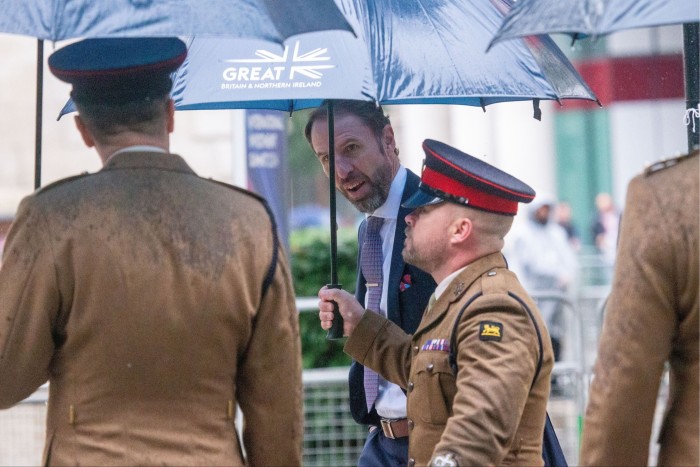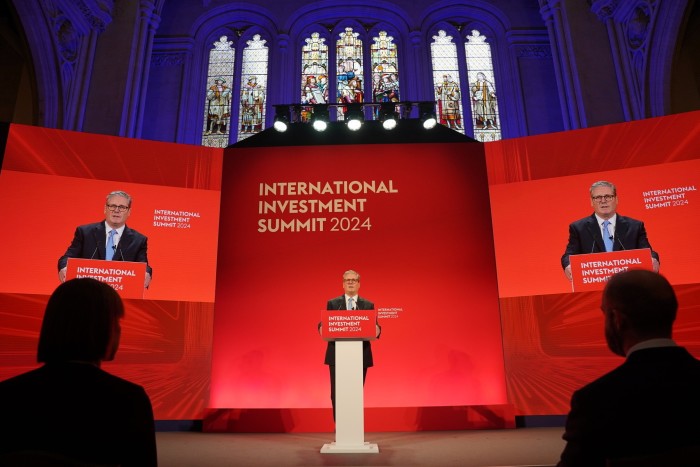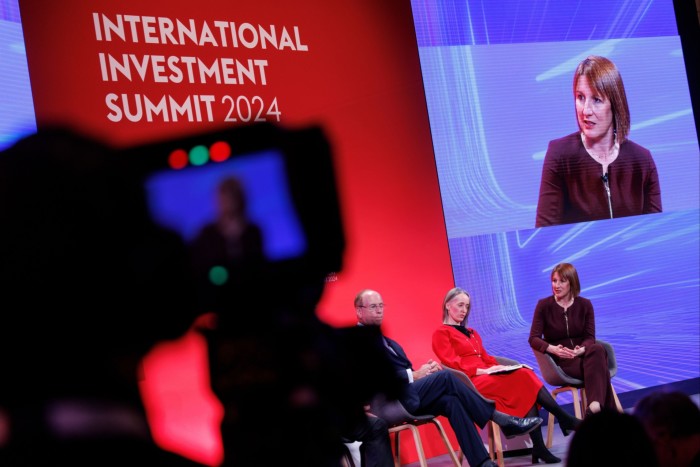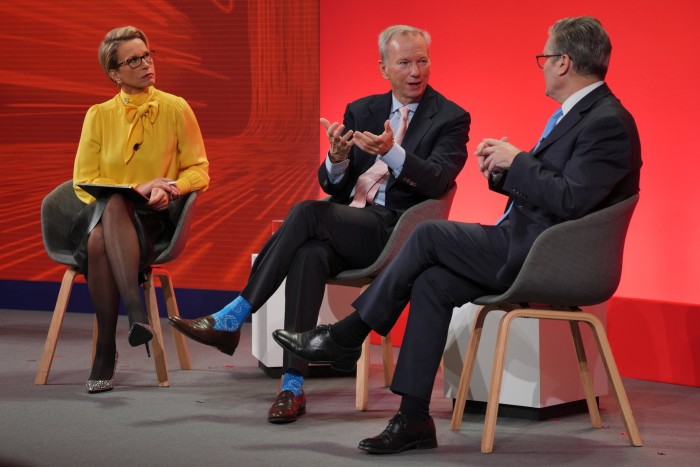
Rain lashed down on London’s historic Guildhall on Monday morning as UK Prime Minister Sir Keir Starmer tried to paint a sunny picture of Britain as an investment destination to the world’s business elite.
Starmer told 200 executives that his Labour government would return the UK to its former status as “an open, outward-looking” nation and “rip up” bureaucracy that blocked investment and economic growth.
His rhetoric was well-received after years of political instability under the Conservatives but some business leaders were still reserving their judgment given Labour’s first Budget is two weeks away.
Starmer had delivered “a compelling rationale for investors in the UK”, said Sir Nicholas Lyons, chair of FTSE 100 pensions group Phoenix. “Obviously the proof of the pudding, ultimately, is in the eating,” he added.
The investment summit was Labour’s chance to set out its stall to international investors. The prime minister has put boosting economic growth at the core of his plan to improve Britain’s ailing public services against a tight fiscal backdrop that limits his spending firepower.
The tension between the government’s pro-business stance and its budgetary constraints was visible in ministers’ rhetoric during the day.
Starmer pledged to unleash a “shock and awe” wave of investment while his chancellor, Rachel Reeves, gave her clearest signal yet that business taxes will rise at the October 30 Budget.

One official said investors at the event had been sizing up Labour, a centre-left party last in government in 2010: “They were mainly trying to get the measure of us, to see if we really mean what we are saying about being pro-business and pro-growth.”
Some attendees were less charitable. “I think a lot of people are here because they feel obliged, rather than feel enthusiastic,” said one businessperson.
Executives have become used to jetting into the UK and France for regular summits aimed at attracting corporate leaders. Late last year then-Conservative prime minister Rishi Sunak held his own investment conference.
“We only gathered 10 months ago for the same event, and the agenda is almost identical,” the businessperson said.
Markus Krebber, chief executive of German energy group RWE, said there was a “relevant question” as to whether the UK needed an annual summit. But he added: “You definitely need it when you have a new government . . . You want to hear their long-term vision.”

Krebber said RWE would invest more quickly in the UK if Starmer succeeded in unbunging bureaucracy and reducing planning delays.
The prime minister, who has a huge majority in Westminster and five years before he has to face the electorate again, sought to persuade investors that years of political upheaval in the UK are at an end.
John Caudwell, the billionaire founder of former mobile phone retailer Phones 4U, is among the businesspeople who have been won over by Starmer’s pitch.
Caudwell once donated to ex-Tory prime minister Boris Johnson but publicly backed Labour before the July election. He said the summit showed the government was “definitely on the right trajectory”.
During the event, ministers hailed £63bn of UK investment pledges by the private sector, much of which had been previously announced.

But another executive cautioned that the government’s progress in the next 100 days would be crucial, after a series of mis-steps in Starmer’s initial three months in office.
“If you want to be successful by the end of your first term, you need to get things going,” they said.
One private equity executive said the investment summit “went fine”, but they wanted to see whether Reeves increased capital gains tax in her October 30 Budget, as well as details of a proposed tax raid on wealthy foreigners living in the UK, who claim tax perks by asserting their domicile is overseas.
“These are the important things and that will be declared by the chancellor in the autumn Budget,” the executive added.
“It is positive, but it is like saying California is open for business. What will the actual policies be?”
One Abu Dhabi fund said it was in a “waiting pattern” regarding new investments into the UK given a “general slowness” from the new government in reviving dealmaking.
The immediate run-up to the summit had highlighted another tension in Starmer’s government: between his outreach to business and Labour’s pro-worker and pro-union roots.
Ahead of the summit, transport secretary Louise Haigh had triggered a row with DP World, the Dubai-based owner of P&O Ferries, the company she suggested boycotting over its controversial firing of 800 staff in 2022. The comments came as Labour rolled out a new package of worker rights.
Starmer publicly distanced himself from the remarks, and DP World pressed ahead with a £1bn investment in an Essex port that was announced as part of the summit.
Starmer business adviser Varun Chandra had called DP World to calm the row, said one government insider.

The event was a mix of past and future. Starmer spoke about artificial intelligence with former Google chief executive Eric Schmidt on a stage built below the 15th century hall’s intricate stained-glass windows.
The summit ended with an evening reception in St Paul’s Cathedral attended by King Charles.
Sir Elton John came out of retirement for the night to play in the cathedral, while dinner was prepared by three-star Michelin chef Clare Smith. “Sounds like a religious experience,” said one chief executive.
Additional reporting by Ian Smith, Rachel Millard and Simeon Kerr

